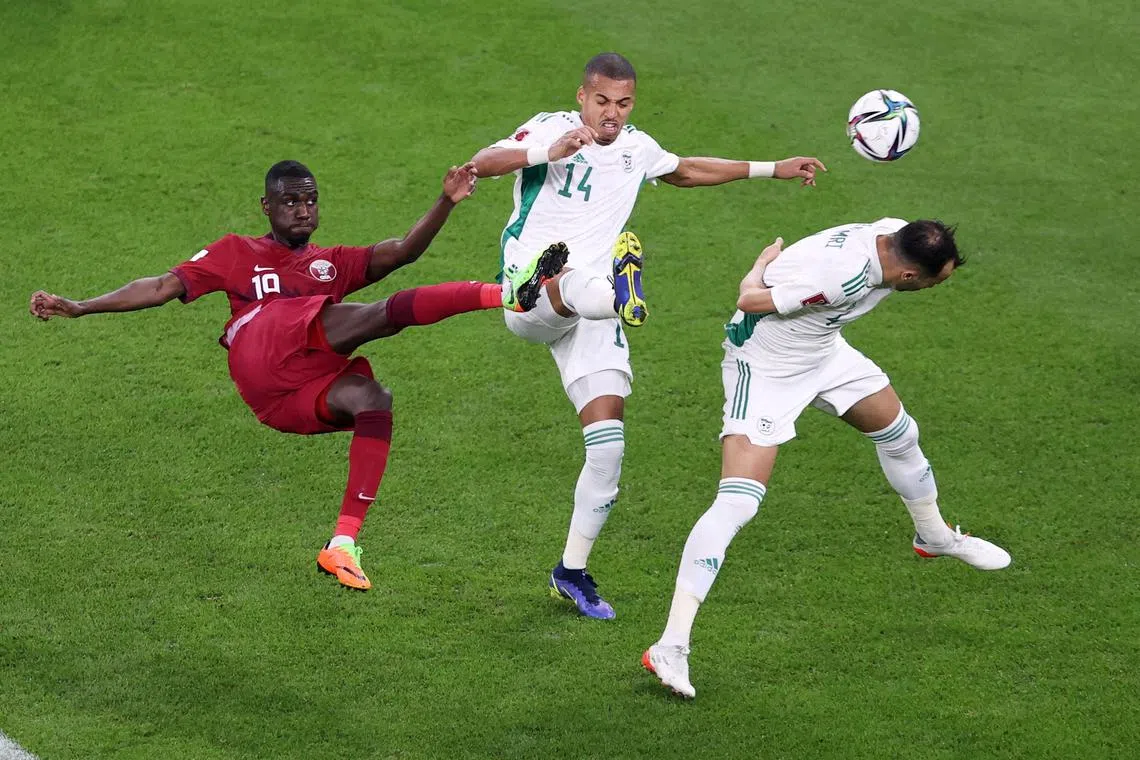Football: World Cup the test of Qatar's expensive bid to develop homegrown talent
Sign up now: Get ST's newsletters delivered to your inbox

Qatar's Almoez Ali shoots at goal in a match against Algeria.
PHOTO: REUTERS
Follow topic:
DOHA – When Qatar play Ecuador in the World Cup showpiece opener on Nov 20, an 18-year, billion-dollar national project to build a respectable – and possibly competitive – national squad will be put to the test.
Victory in that opening match, the team’s first appearance at global football’s showpiece event, would give Qatar vital points and the momentum needed to make it through to the last 16, said former Qatar forward Mohamed Mubarak al-Mohannadi.
“I’m looking to win the first game. It’s the most important... We’re not asking them to (win) the World Cup,” he added.
Most of Qatar’s World Cup side – the majority of whom are nationals and expatriates born, raised and naturalised in Qatar – were scouted as kids and came up through the ranks of the US$1.3 billion (S$1.8 billion) Aspire Academy.
Sheikh Jassim Bin Hamad Al-Thani, brother of Qatar’s ruling emir, established Aspire in 2004 to develop home-grown players – six years before Qatar’s national team automatically qualified for the 2022 World Cup after being named host country.
Many of the side, including star duo Akram Afif and top-scorer Almoez Ali, have been playing together under Spanish-born coach Felix Sanchez since 2014.
He led them as an Under-19 side to the AFC Youth Championship.
“A lot of these players have been with (Sanchez) since they were kids... he’s like a father to these guys,” said Mohamed El Gharbawy, a Qatar-based football journalist.
In Qatar, Sanchez is credited with instilling a distinctly Spanish style of “one touch, small pass, good teamwork, possession-based play” soccer, said Ahmed Hashim, editor of Qatar Football Live, a twitter channel.
Since June, Sanchez has taken Qatar’s players to training camps in Spain and Austria.
They then played friendlies in September, losing to Canada and Croatia’s Under-23s and drawing with Chile. In recent weeks, they defeated Nicaragua, Guatemala and Honduras.
The mixed performance suggests they are no heavyweights; they might not stand a chance against their other World Cup Group A opponents, Senegal and the Netherlands.
But the Qataris have surprised in the past, most famously when they won the 2019 Asian Cup after a dramatic 3-1 final win over Japan and a 4-0 thrashing of hosts United Arab Emirates in the semi-finals.
Sanchez has since made few changes to Qatar’s starting XI.
“Some might say the continuity helps. Some might say that if we had spots open for competition, that would increase the players’ performance and motivation levels,” said Hashim.
“We won’t be able to tell if that’s a good thing or a bad thing until after the World Cup.” REUTERS

